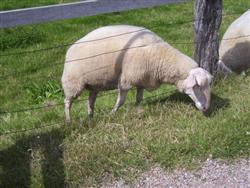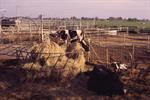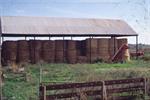Study Sustainable Agriculture - a detailed course looking at sustainable farming practices
 This course is aimed at those who want to help the world move towards the preservation of our natural resources and to maintain the delicate balance of our ecosystems. Economic, commercial, marketing and production techniques are explored in a multifaceted way to help move a farm towards improved sustainability.
This course is aimed at those who want to help the world move towards the preservation of our natural resources and to maintain the delicate balance of our ecosystems. Economic, commercial, marketing and production techniques are explored in a multifaceted way to help move a farm towards improved sustainability.
Sustainable agricultural practices must not impact negatively on the environment therefore this course encourages:
- The investigation of how farming practices impacts on and shapes the future of the environment.
- Farming practices that suit the local environment and reduce the impact on it.
- Examination of the best use of natural resources; the use of water in production; preservation. of soil quality; responsible use of chemicals and fertilizers; reducing the potential for salinity and pollution of waterways.
- The conservation of biodiversity.
- Long term improvements in productivity.
- Social improvement, through sustainable practices (both monetary and non-monetary).
- Flexibility and risk management (in fluctuating markets and climate variations).
COURSE STRUCTURE
There are 8 lessons as follows:
Lesson 1 - Introduction
- Sustainable ways of farming
- Whole farm planning
- Land Management programs
- Sustainable ways of farming
- Natural farming
- Organic farming
- Permaculture
- No Dig techniques
- Biodynamics
Lesson 2 - Soils
- Growing media
- Major types of soil problems
- Soil structural decline
- Erosion
- Salinity
- Acidification
- Soil improvements
- Phytotoxicity
- Adding organic matter to soils
- Cultivation techniques
- Conservation tillage
- Plant nutrition
- Soil life
- Cover crops
Lesson 3 -Water
- Types of water storage
- Livestock water requirements
- Water problems
- Water quality
- Reed beds
- Water saving measures
- Recycling
- Swales and keylines
- Irrigation systems
Lesson 4 - Land Care
- Weed Management
- Preventative measures
- Tree management
- Timber lots/plantations
- Wind breaks
- Wildlife corridors
- Wildlife habitats
- Pest and diseases
Lesson 5 - Financial Sustainability
- Economic principles
- Developing a Farm Business Plan
- Financial plan
- Controlling growth
- Value adding
- Enterprise mix
- Eco-tourism
Lesson 6 - Broad Management Strategies
- Toward better planning
- Land care or land management
- New enterprises
- Broad management categories
- Marketing
- Personal welfare
- Plan drawing of farm
- Looking at risk
- Quality systems
Lesson 7 - Plant Enterprises
- Crop management
- Hydroponic fodder
- Hay
- Considering new crops
- Nuts
- Organic farming
- Agro-forestry
- Hydroponics
- Herbs
Lesson 8 - Animal Enterprises
- Deer
- Ostriches
- Emus
- Alpacas
- llama
- Goats
- Aquaculture
- Wool and meat production
- Horses
Each lesson culminates in an assignment which is submitted to the school, marked by the school's tutors and returned to you with any relevant suggestions, comments, and if necessary, extra reading.
COURSE AIMS
- Understand the broad possibilities for improving sustainability on farms.
- Understand how to avoid serious degradation of soils on a farm through sustainable management.
- Understand the broad possibilities for improving sustainability on farms.
- Understand how to avoid too serious degradation of soils on a farm through water management.
- Understand Economic Rules that apply to a farm Enterprise.
- Crop management techniques for sustainability.
- Minimising degradation through planning and management.
- Evaluate the financial viability and potential of animal enterprises.
WHAT THE COURSE COVERS
Here are just some of the things you may be doing:
 Investigate what is being done for improving agricultural sustainability in your country or region.
Investigate what is being done for improving agricultural sustainability in your country or region.- Contact different organisations or farmers and find out what you can about attitudes & resources available to assist with improving sustainability in your chosen area/Country/region.
- Investigate whether an organic certification scheme operates in your country, and if so, find out what is involved currently in attaining that certification for a farm.
- Obtain either literature or advice relating to the management to soil degradation in your locality.
- Identify the most important issues that farmers need to address in a region within approximately 100 km (or 50 miles) of your home; in order to remain financially viable over the next two decades
- Distinguish between hydroponics, permaculture, biodynamics and certified organic farming.
- Identify a farm situation where it might be appropriate to convert to either permaculture, biodynamics or certified organic system.
- What is being done to improve sustainability of agriculture in the region, country or state of your choice.
- Obtain information from your local government department or irrigation supply company. Find out what the local water quality is like and how it was measured.
- Explain how you can test your local water supply for contaminants. What contaminants were found? eg. Bacteria, heavy metals, silt etc.
- Outline how can these contaminants be removed from the local water supply e.g. filtration, chemicals, etc.
- Identify cost effective means by which contamination can be prevented.
- Identify types of water catchment in your local area. e.g. dams, streams, creeks etc.
- Find out what types of conservation are being practised in your local area.
- Outline methods of pest control being practised in your area.
- Describe methods of weed control used in your area.
- Identify and describe any natural control methods being used in your area.
- Research tourism activities are available in your local area.
- Investigate planning and advisory services in your local area.
- Investigate existing animal enterprises in your local area and the economic impact.
What is the Future of Farming?
First there was subsistence farming. Then there was a technological revolution: developments in machinery and chemicals allowed us to clear and cultivate land faster, feed plants and animals quicker (and grow them faster); and kill pests or diseases quickly. These new found abilities seemed like a godsend to mankind; and throughout the 20th century we have used them to their fullest, generally with little regard for any unforeseen repercussions.
Gradually, time has revealed a variety of problems caused by this modern agricultural development; including; chemical residues affecting plant and animal life on land and in the sea, soil degradation in the form of soil structural decline, erosion, salinity, soil acidification, loss of fertility, nutrient loading of waterways, dams and lakes and more.
As we move into the 21st century; and concern about our environment grows, there is an obvious move towards more sustainable farming.
Sustainable farming is in essence concerned with anything that affects the sustainability of a farm. You cannot keep farming a property indefinitely, if there is a degradation of resources (environmental resources, financial resources, equipment, machinery, materials, or any other resources). In the short to medium term, the problem of sustainability is overwhelmingly a financial one; but in the long term, environmental sustainability will have perhaps more impact than anything else upon the whole industry.
Why Change?
 The world is changing. You cannot avoid change. If we can't sustain agricultural production, we will eventually see a decline in production; hence a decline in food and other supplies. There is no escaping the fact that people need agricultural products to survive; for food, clothing, etc. Science may be able to introduce substitutes (e.g. synthetic fibres); but even the raw materials to make these will generally be limited. The world’s population is increasing (or at best remaining stable in some places); hence demand for agricultural produce is increasing. Poorly maintained farms produce less in terms of quantity and quality. Profitability decreases means that surplus money is no longer available for repair and improvements. Farmland can become contaminated with chemical residues, weeds or vermin. The amount of vegetation produced (i.e. the biomass), may reduce, resulting in less production of carbon dioxide, and a greater susceptibility to environmental degradation.
The world is changing. You cannot avoid change. If we can't sustain agricultural production, we will eventually see a decline in production; hence a decline in food and other supplies. There is no escaping the fact that people need agricultural products to survive; for food, clothing, etc. Science may be able to introduce substitutes (e.g. synthetic fibres); but even the raw materials to make these will generally be limited. The world’s population is increasing (or at best remaining stable in some places); hence demand for agricultural produce is increasing. Poorly maintained farms produce less in terms of quantity and quality. Profitability decreases means that surplus money is no longer available for repair and improvements. Farmland can become contaminated with chemical residues, weeds or vermin. The amount of vegetation produced (i.e. the biomass), may reduce, resulting in less production of carbon dioxide, and a greater susceptibility to environmental degradation.
We have created a world that relies heavily on technology to produce the food needed to sustain its human population. There is a worldwide dilemma. To abandon modern farming methods could result in world wide famine, but to continue current practices will almost certainly result in long term degradation of farmland; and eventually, the inability to sustain even current human population levels, without even considering future increases in the human population.
Today the pressure is on for more and more farmers to work towards sustainable systems of farming which produce healthy, nutritious, affordable food and a dependable, secure food supply -without producing a negative impact on the environment. Sustainable farms should protect the environment, preserve open spaces, forests and wildlife and also encourage and conserve biodiversity, plus provide the farmer and farm workers with a good living.
This course is aimed at those who want to help the world move towards the preservation of our natural resources and to maintain the delicate balance of our ecosystems. Economic, commercial, marketing and production techniques are explored in a multifaceted way to help move a farm towards improved sustainability.
Sustainable agricultural practices must not impact negatively on the environment -
This course encourages:
- The investigation of how farming practices impacts on and shapes the future of the environment.
- Farming practices that suit the local environment and reduce the impact on it.
- Examination of the best use of natural resources; the use of water in production; preservation of soil quality; responsible use of chemicals and fertilizers; reducing the potential for salinity and pollution of waterways.
- The conservation of biodiversity.
- Long term improvements in productivity.
- Social improvement, through sustainable practices (both monetary and non- monetary).
- Flexibility and risk management (in fluctuating markets and climate variations).
Why Enrol on Sustainable Agriculture Today?
This course will:
- Provide you with detailed and thorough knowledge of sustainable agriculture.
- Develop or improve your existing practices for optimising resources - water, land, animals, crops.
The course will also improve your job and career prospects by showing that you are committed and keen to learn more about sustainable agriculture. It also shows that you are staying up to date with agricultural practices.
Any Questions?